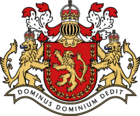House of Anthord: Difference between revisions
Jump to navigation
Jump to search
No edit summary |
No edit summary |
||
| Line 37: | Line 37: | ||
|distinctions = <!-- Primarily associated distinctions such as orders, prizes, awards, etc. --> | |distinctions = <!-- Primarily associated distinctions such as orders, prizes, awards, etc. --> | ||
|traditions = <!-- Religion, philosophy, movement, adherence, allegiance, etc. --> | |traditions = <!-- Religion, philosophy, movement, adherence, allegiance, etc. --> | ||
|motto = '' | |motto = ''Dominus dominium dedit'' | ||
|motto_lang = {{wp|Latin}} | |motto_lang = {{wp|Latin}} | ||
|motto_trans = The Lord hath given dominion unto me | |motto_trans = The Lord hath given dominion [unto me] | ||
|heirlooms = <!-- Inheritances; antiques, mementoes, jewelry, etc. --> | |heirlooms = <!-- Inheritances; antiques, mementoes, jewelry, etc. --> | ||
|estate = | |estate = | ||
Revision as of 01:07, 1 April 2020
| House of Anthord | |
|---|---|
| Royal house | |
 Royal Coat of Arms of Great Nortend | |
| Parent family | Anthords of [Albish place] |
| Country | Great Nortend |
| Current region | Teudallum |
| Place of origin | Albeinland |
| Current head | Alexander II of Great Nortend |
| Titles | Titles of the House of Anthord
|
| Motto | Dominus dominium dedit (The Lord hath given dominion [unto me]) |
The House of Anthord is the reigning royal house of Great Nortend. It is descended from the Anthords of [] of Albeinland, who gained the throne after Albert of the House of Destern died without issue in 1518. After the death of Mary in 1772, the Albish House of Oln ruled Great Nortend until the House of Anthord regained the throne upon the accession of Edmund VII in 1813, the son of Catherine I of Oln and Prince Henry de Anthord.
In 1974, Catherine II married Prince Andrew of the noble House of Mere-Lucas, a cadet branch of the House of Anthord which held the dukedom of Mere-Lucas. Henceforth, the dynasty was renamed the House of Anthord-Mere-Lucas, although in common parlance the house remains known as the House of Anthord.
Monarchs
This page is written in Erbonian English, which has its own spelling conventions (colour, travelled, centre, realise, instal, sobre, shew, artefact), and some terms that are used in it may be different or absent from other varieties of English. |
